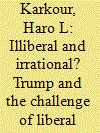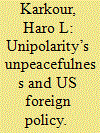| Srl | Item |
| 1 |
ID:
182566


|
|
|
|
|
| Summary/Abstract |
Building on a growing body of literature on the application of Morgenthau’s ethics to post-Cold War US foreign policy, this article applies Morgenthau’s concept of irrationality to Trump’s foreign policy. Based on this application, the article highlights the limit of rationality in Morgenthau’s theoretical analysis. Specifically, the article argues, pace neo-realist critiques of ‘liberal hegemony’, that Trump reveals an empirical puzzle: US foreign policy can be both irrational and illiberal simultaneously in the pursuit of nationalistic universalism. This is the case, the article argues, because nationalistic universalism in Morgenthau’s analysis is not rooted in liberalism per se but the dynamics of liberal modernity. The Trump puzzle thus reveals an on-going tension between rationality and liberal modernity in Morgenthau’s theoretical analysis: rationality offers an insufficient tool to take upon the challenge of liberal modernity from which Trump’s nationalistic universalism stems. This, the article concludes, leaves Morgenthau’s concept of interest ‘defined in terms of power’ open to misappropriation to ends contrary to their original aim: furthering nationalistic universalism, rather than limiting power.
|
|
|
|
|
|
|
|
|
|
|
|
|
|
|
|
| 2 |
ID:
184963


|
|
|
|
|
| Summary/Abstract |
In their critique of liberal modernity, classical realists theorized its consequence for the heightened sense of insecurity and powerlessness of the individual on the one hand, and the individual's identification with extreme nationalism and violence on the other. This became the challenge posed by liberal modernity in the post-1945 international order. The article argues that the present international order is an extension of the post-1945 order that never resolved this challenge. While the ‘embedded’ form of liberalism that lasted until the early 1970s made social compromises that mitigated the socio-economic insecurities of the individual in liberal modernity, it did not resolve this challenge. The later advancement of neo-liberalism only further intensified it. The article thus critiques existing debates that downplay the challenge of liberal modernity in their analyses of the crisis of the present international order. It concludes that if the present international order is to be put on more stable and peaceful grounds, it requires a more radical break from its post-1945 and post-Bretton Woods past: a break that does not simply call for ‘leadership’ or ‘offshore balancing’ but addresses the psycho-social needs of the individual in liberal modernity.
|
|
|
|
|
|
|
|
|
|
|
|
|
|
|
|
| 3 |
ID:
157786


|
|
|
|
|
| Summary/Abstract |
Drawing on Hans J. Morgenthau, this article argues that a key contributor to the unpeacefulness of the post–Cold War unipolar order was the irrationality of US foreign policy. Post–Cold War US foreign policy was irrational in that it failed to base its strategy on the prudent evaluation of the empirical facts in the social and political context in which it was formulated. Instead, it reinterpreted reality in terms of a simplistic picture of the world as accepted by US policymakers a priori, and sought the use of military force as the sole national security strategy to impose the inviolability of the ideals entailed in this picture. This turned post–Cold War US foreign policy into a self-contradictory endeavour as far as the results were concerned: not only did it confuse desirable for essential interests in standardising the enemy – whether Milosevic, Saddam or Qaddafi – to fit the a priori categorisation, but it also opened a gap between the desirable and the possible. For one thing such an irrational post–Cold War US foreign policy failed to accommodate or annul was the empirical reality of conflicting interests in the social and political contexts upon which it sought to impose its a priori picture. This resulted in consequences that were untenable from the standpoint of US objectives and international peace and security, contributing, overall, to the unpeacefulness of the post–Cold War unipolar order.
|
|
|
|
|
|
|
|
|
|
|
|
|
|
|
|